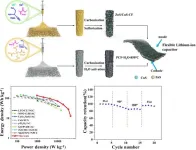(Press-News.org) AURORA, Colo. (January 16, 2024) – Researchers from the University of Colorado Anschutz Medical Campus have found that a team intervention, provided by phone, leads to persistent improvements in depression, anxiety, and quality of life for people managing chronic illnesses. Additionally, researchers found that the improvement in quality of life results last months after intervention concludes.
In a study, published today in JAMA, researchers observe the impact a telecare intervention program, called ADAPT, has on veterans suffering from poor quality of life as a result of existing chronic illnesses, such as chronic obstructive pulmonary disease (COPD), heart failure (HF) and interstitial lung disease (ILD). This program provides palliative care that is not widely available and tackles health concerns that may be missed in standard appointments. Nurses and social workers reach out to study participants with structured questions and assistance, then discuss responses with a team of doctors, including specialists, to determine how best to address concerns with follow-up calls to track progress.
“While we do a great job caring for these patients’ illnesses, we can do more for quality of life. Many have persistent symptoms, such as depression, anxiety, shortness of breath, and sleep problems that can make living with these illnesses very difficult and have been associated with earlier death” says David Bekelman, MD, MPH, professor at the University of Colorado School of Medicine and study lead author. “Palliative care can help. However, access to outpatient palliative care specialists is limited to non-existent, and new, scalable ways to provide early palliative care are needed.”
For adults with COPD, HF or ILD at high risk of hospitalization and death and poor quality of life, this program demonstrated early, persistent and clinically meaningful improvements in depression, anxiety, and quality of life. Additionally, while ADAPT lasted for 4 months, Bekelman and researchers saw positive results early that lasted for many months after the program ended.
“There are people who endure persistent symptoms and poor quality of life despite great treatments. We need to fill in the gaps and provide more for these patients,” says Bekelman who worked with the VA of Eastern Colorado Puget Sound Health Care Systems to conduct this research to conduct this research. “This innovative team care model is adaptable, scalable and can help make life better for people living with these illnesses. This program demonstrates that even a short amount of time providing structured telecare results in increased quality of life months after the calls end.”
About the University of Colorado Anschutz Medical Campus
The University of Colorado Anschutz Medical Campus is a world-class medical destination at the forefront of transformative science, medicine, education and patient care. The campus encompasses the University of Colorado health professional schools, more than 60 centers and institutes, and two nationally ranked independent hospitals - UCHealth University of Colorado Hospital and Children's Hospital Colorado - that treat more than two million adult and pediatric patients each year. Innovative, interconnected and highly collaborative, the University of Colorado Anschutz Medical Campus delivers life-changing treatments, patient care and professional training and conducts world-renowned research fueled by over $704 million in research grants. For more information, visit www.cuanschutz.edu.
END
Palliative telecare significantly improves quality of life for those with chronic illnesses, and results last for months
When working with nurse and social worker virtually, trial participants with chronic heart and lung diseases report long-lasting improvements
2024-01-16
ELSE PRESS RELEASES FROM THIS DATE:
Experiment could test quantum nature of large masses for the first time
2024-01-16
An experiment outlined by a UCL (University College London)-led team of scientists from the UK and India could test whether relatively large masses have a quantum nature, resolving the question of whether quantum mechanical description works at a much larger scale than that of particles and atoms.
Quantum theory is typically seen as describing nature at the tiniest scales and quantum effects have not been observed in a laboratory for objects more massive than about a quintillionth of a gram, or more precisely 10^(-20)g.
The new experiment, described in a paper published in Physical Review Letters and involving researchers at UCL, the University of Southampton and ...
Ten scientists receive EMBO Installation Grants
2024-01-16
16 January 2024 – EMBO is pleased to announce that ten life scientists have been awarded EMBO Installation Grants, which support group leaders who will move to, or have recently moved to, countries participating in the scheme. The scientists’ inspiring research spans a wide range of biological processes: ageing, tumour biology, gut-brain axis communication, microbiota and gene editing tools are among the topics they are exploring.
One installation grantee will establish a laboratory in the Czech Republic, one in Greece, two in Hungary, ...
Dual-metal sulfides improve overall function of anode material in lithium-ion capacitors
2024-01-16
The use of dual metal sulfides, specifically ZnS/CuS, shows marked improvement in electrochemical stability and performance when included in the design of flexible lithium-ion capacitors over the use of transition metal sulfides and carbon fiber materials.
Technology is becoming more and more integrated with daily life, especially wearable, flexible tech and smart devices. Transition metal sulfide (TMS) materials are popular among choices for anodes in developing flexible lithium-ion capacitors ...
New method for addressing the reliability challenges of neural networks in inverse imaging problems
2024-01-16
Uncertainty estimation is critical to improving the reliability of deep neural networks. A research team led by Aydogan Ozcan at the University of California, Los Angeles, has introduced an uncertainty quantification method that uses cycle consistency to enhance the reliability of deep neural networks in solving inverse imaging problems.
This research was published Dec. 21 in Intelligent Computing, a Science Partner Journal.
Deep neural networks have been used to solve inverse imaging problems, such as image denoising, ...
Aston University receives £10m from Research England to establish the Aston Institute for Membrane Excellence
2024-01-16
The Aston Institute for Membrane Excellence (AIME) will be set up with a £10m grant from Research England
AIME will be led by Professor Roslyn Bill from Biosciences and Professor Paul Topham from Chemical Engineering and Applied Chemistry
The globally unique institute will use biomimetic polymer membranes for applications such as water purification and drug development
Aston University will establish the Aston Institute for Membrane Excellence (AIME), a globally unique, cross-disciplinary institute to develop novel biomimetic membranes, after receiving a major grant of £10m from Research England.
AIME will be led by Professor Roslyn Bill, from the School ...
Innovative COVID-19 analysis supports prevention protocols in health care settings
2024-01-16
In early 2020, severe acute respiratory syndrome coronavirus 2 (SARS-CoV-2), a highly contagious and pathogenic virus, made its alarming debut and quickly spread worldwide, causing the novel coronavirus (COVID-19) pandemic that threatened human health and public safety. While the world was brought to a standstill, hospitals and health care systems entered unchartered territory and quickly adapted to the evolving health crisis to care for their community and keep potentially sick patients and health care workers from spreading the virus.
The magnitude of response involved the reinforced universal masking of health care ...
New study mapping entire genome of oral stem cells opens new doors for regenerative medicine
2024-01-16
Cambridge, Mass., Jan. 16, 2024 - A team of researchers from the ADA Forsyth Institute and University of North Carolina (UNC), Chapel Hill used single-cell transcriptomic analysis to successfully map dental pulp stem cells (DPSC) and periodontal ligament stem cells (PDLSC) and found remarkable differences between them. The study, which appeared in the Journal of Dental Research, provides the most detailed analysis of these stem cells to date, identifying the entire genome of the stem cells and their potential differentiation trajectories.
“Dental pulp and periodontal ligament stem cells both have the potential to develop into any type of cell in the body,” ...
Do violent video games numb us towards real violence?
2024-01-16
Neuroscientists from the University of Vienna and the Karolinska Institute in Stockholm have investigated whether playing violent video games leads to a reduction in human empathy. To do this, they had adult test subjects play a violent video game repeatedly over the course of an experiment lasting several weeks. Before and after, their empathic responses to the pain of another person were measured. It was found that the violent video game had no discernible effect on empathy and underlying brain activity. These results have now been published in the renowned journal eLife.
Video games have become an integral part of the everyday life of many ...
Novel AI platform matches cardiologists in detecting rheumatic heart disease
2024-01-16
WASHINGTON (Jan. 16, 2024) – Artificial intelligence (AI) has the potential to detect rheumatic heart disease (RHD) with the same accuracy as a cardiologist, according to new research demonstrating how sophisticated deep learning technology can be applied to this disease of inequity. The work could prevent hundreds of thousands of unnecessary deaths around the world annually.
Developed at Children’s National Hospital and detailed in the latest edition of the Journal of the American Heart Association, the new AI system combines the power of novel ultrasound probes with portable electronic ...
Researchers examine accuracy of adult body weight estimates in the emergency department
2024-01-16
Knowing a patient’s weight is necessary for many weight-based medications such as thrombolytics, anticoagulants and numerous cardiovascular medications. Scaling drugs to a patient’s weight prevents adverse events from overtreatment and treatment failure due to underdosing. Inaccurate weight estimations may lead to inaccurate drug doses, which could cause patient harm.
However, in the emergency department (ED) during resuscitative care, measuring weight is often impossible. Moreover, little is known about the relative accuracy of different methods currently used to weigh patients during emergency care. For example, ...
LAST 30 PRESS RELEASES:
Scientists discover why we know when to stop scratching an itch
A hidden reason inner ear cells die – and what it means for preventing hearing loss
Researchers discover how tuberculosis bacteria use a “stealth” mechanism to evade the immune system
New microscopy technique lets scientists see cells in unprecedented detail and color
Sometimes less is more: Scientists rethink how to pack medicine into tiny delivery capsules
Scientists build low-cost microscope to study living cells in zero gravity
The Biophysical Journal names Denis V. Titov the 2025 Paper of the Year-Early Career Investigator awardee
Scientists show how your body senses cold—and why menthol feels cool
Scientists deliver new molecule for getting DNA into cells
Study reveals insights about brain regions linked to OCD, informing potential treatments
Does ocean saltiness influence El Niño?
2026 Young Investigators: ONR celebrates new talent tackling warfighter challenges
Genetics help explain who gets the ‘telltale tingle’ from music, art and literature
Many Americans misunderstand medical aid in dying laws
Researchers publish landmark infectious disease study in ‘Science’
New NSF award supports innovative role-playing game approach to strengthening research security in academia
Kumar named to ACMA Emerging Leaders Program for 2026
AI language models could transform aquatic environmental risk assessment
New isotope tools reveal hidden pathways reshaping the global nitrogen cycle
Study reveals how antibiotic structure controls removal from water using biochar
Why chronic pain lasts longer in women: Immune cells offer clues
Toxic exposure creates epigenetic disease risk over 20 generations
More time spent on social media linked to steroid use intentions among boys and men
New study suggests a “kick it while it’s down” approach to cancer treatment could improve cure rates
Milken Institute, Ann Theodore Foundation launch new grant to support clinical trial for potential sarcoidosis treatment
New strategies boost effectiveness of CAR-NK therapy against cancer
Study: Adolescent cannabis use linked to doubling risk of psychotic and bipolar disorders
Invisible harms: drug-related deaths spike after hurricanes and tropical storms
Adolescent cannabis use and risk of psychotic, bipolar, depressive, and anxiety disorders
Anxiety, depression, and care barriers in adults with intellectual and developmental disabilities
[Press-News.org] Palliative telecare significantly improves quality of life for those with chronic illnesses, and results last for monthsWhen working with nurse and social worker virtually, trial participants with chronic heart and lung diseases report long-lasting improvements







